Students
Find here the list of the graduate students currently enrolled in our Ph.D. program; A Twitter feed is managed by D3 Ph.D. students @B2f2Phd

Veronica Bresciani
Cycle 38th
Supervisor: Professor Maurizio Recanatini
Co-supervisor: Professor Matteo Masetti
PhD title: Computational Characterization of Small Molecule-RNA Interaction
Project Description: The project focuses on RNA as a drug target by studying known small molecule-RNA complexes. Computational methods will be used to investigate available complexes and representative case studies will be selected. Molecular Dynamics simulations will be used to study the nucleic acid’s conformational ensemble and the binding mechanism between the small molecule and RNA.
Personal background: Graduated in Pharmaceutical Chemistry and Technology at Università di Bologna in 2022.
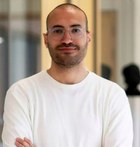
Daniele Esposito
Cycle 38th
Supervisor: Professor Rita Morigi
Co-supervisor: Professor Maria Laura Bolognesi
PhD title: Design and synthesis of heterocyclic small molecules as anti-proliferative agents against innovative targets
Project Description: During the PhD, our aim will be to directly contribute to the cancer research, designing heterocyclic scaffolds that could actually work as antiproliferative agents. To successfully obtain results on these fields, we will optimize the activity on known structures such as DNA’s G4s, but we will also synthetize new molecules studying their activity on innovative targets.
Personal background: Daniele Esposito obtained his MSc degree in Chemistry and Pharmaceutical Technologies at University of Naples “Federico II” with 110/110 with honour in 2022, working on a Medicinal Chemistry Thesis. Following the graduation, he spent the next five months at the Max Planck Institute for Molecular Physiology in Dortmund, Germany, to work on the synthesis of RIBOTACs as Erasmus Trainee.
After the Traineeship, he started his PhD in Medicinal Chemistry at the University of Bologna, under the supervision of Professor Rita Morigi, to work on the synthesis of anti-proliferative small molecules against innovative targets.

Gianfranco Martino
Cycle 38th
Supervisor: Marco De Vivo
PhD title: Molecular simulations of large regulatory RNA
Project description: Integration of computational, structural and biochemical data in order to disclose the 3D architecture of large regulatory RNAs and their functional dynamics.
Personal background: Master degree in Scienze Chimiche at Università degli Studi di Milano, M2 in In Silico Drug Design at Universitè Paris Citè (double degree)

Camilla Morosini
Cycle 38th
Supervisor: Prof. Moreno Paolini
Co-supervisor: Dott.ssa Donatella Canistro
PhD title: Impact of Heated Tobacco Products on oxidative status and inflammatory processes involved in the development of peripheral and CNS damage
Project Description: The aim of the PhD research project is to evaluate the effects of HTPs emission on oxidative stress and antioxidant enzymatic machinery as well as on key signalling pathways involved in cell cycle, apoptosis, and DNA damage.
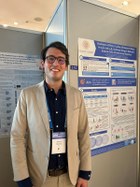
Andrea Maurizio
Cycle 38th
Supervisor: Prof.ssa Monica Baiula
Co-supervisor: Prof. Andrea Bedini
PhD Title: “Analysis of the anti-cancer and antinflammatory effects of innovative integrin ligands”
Project Description: The aim of the PhD research project is the pharmacological characterization of innovative integrin ligands. In particular, we’re going to evaluate compounds effects in reducing tumor cells survival, proliferation and metastasis; as well as integrin antagonists ability in reducing inflammation in inflammatory-based diseases.
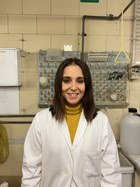
Rebecca Orioli
Cycle 38th
Supervisor: Prof.ssa Alessandra Bisi
PhD title: Targeting enzymes involved in neurodegeneration.
Project description: This PhD project aims to design and synthesize new potential drug candidates targeting enzymes that play a crucial role in neuroinflammation and neurodegeneration. I will focus on the design and synthesis of new molecules with simultaneous modulation of three kinases, GSK-3b, Fyn and DYRK-1A, and on the design and synthesis of new potential COX inhibitors.
Personal background: Graduated in Pharmaceutical Chemistry and Technologies from Alma Mater Studiorum - University of Bologna with 110/110 with honor in 2022, with a thesis focused on the design and synthesis of dual inhibitors toward two kinases involved in neuroinflammation.

Sara Roggiani
Cycle 38th
Supervisor: Prof.ssa Patrizia Brigidi
Co-supervisor: Dott.ssa Serena Tongiani
PhD title: Plant extract nutraceutical ingredients as modulators of the gut microbiome: insights into their mechanisms of action from a prophylactic and therapeutic perspective
Project Description: Plant extract nutraceutical ingredients are very promising modulators of the gut microbiota, given the historical use of most of them in ameliorating symptoms of gastrointestinal disorders, however, their impact on gut microbiota composition and functionality is less explored. By setting up an ex vivo minimal gut model and in vivo experiments, the PhD project aims to provide insights into the mechanisms underlying gut microbiota modulating properties of plant extract-based nutraceuticals. The results of this study could ultimately support the use of plant extract nutraceutical ingredients in personalized intervention strategies for treating diseases in which dysbiosis plays a key role.
Personal background: Graduated in Pharmaceutical Biotechnology at University of Bologna with 110/110 cum laude in 2022.

Martyna Malgorzata Rydzyk
Cycle 38th
Supervisor: Prof. Stefano Iotti
Co-Supervisor: Dott.ssa Concettina Cappadone
PhD title: Set up of a 3D osteosarcoma model: studying tumor microenvironment and testing differentiating treatment.
Project description: Osteosarcoma is a heterogeneous malignant disease characterized by loss of differentiation blocks leading to the formation of immature cells with an aggressive phenotype. This PhD project is focused on developing a 3D model of osteosarcoma to gain new insights into the pathogenesis of the tumor and suggest a therapeutic strategy. To mimic the complexity of the tumor microenvironment, different cell types, especially endothelial cells and mesenchymal stem cells, will be co-cultured.
Personal background: Graduated in Pharmaceutical Chemistry and Technologies from Alma Mater Studiorum - University of Bologna in 2022.

Eleonora Serra
Cycle 38th
Supervisor: Andrea Cavalli
Co-Supervisor: Francesco Di Palma e Sergio Decherchi
PhD title: Innovative strategy for Binding Free Energy computation
Project description: evaluate the state of the art of Free Energy estimators and define innovative strategy for the binding free energy computation by using alchemical and phisical path-based appproach.
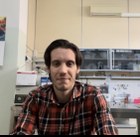
Giuseppe Tosini
Cycle 38th
Supervisor: Prof. Patrizia Brigidi
Co-supervisor: Dr. Vittorio Lucchini
PhD title: Identification and study of the healthy microbiota profile in the italian population and identification of microbials signature associated with non-communicable diseases related to nutrition
Project Description: The aim of my PhD project is the study and characterization of specific gut microbiota signatures associated with specific NC pathologies through metagenomics and bioinformatics approach.
Personal background: Graduated in Experimental and Applied Biology at University of Pavia. I am a molecular biologist at NGB Genetics dealing with ngs, genotyping, STR analysis and forensic analysis.

Francesca Valenti
Cycle 38th
Supervisor: Prof. Romana Fato
Co-supervisor: Prof. Christian Bergamini
PhD title: Study of the role of the mevalonate pathway inhibition on the CoQ10 and Cholesterol levels in cultured cells
Project Description: Statins represent the golden standard therapy for the treatment of hypercholesterolemia; however the treatment produces some side effects, such as mialgia. Statins inhibit the HMG-CoA reductase enzyme, which is the key enzyme for the biosynthesis of cholesterol, coenzyme Q10 and other molecules. This project aims to study the impact of statins on mitochondria and the CoQ10 levels in order to establish a possible connection with mialgia.
Personal background: Graduated in Pharmaceutical Biotechnologies (110 cum laude, University of Bologna, 2020)

Giulia Varignani
Cycle 38th
Supervisor: Professor Andrea Cavalli
Co-supervisor: Dr. Stefania Girotto
PhD title: Structural and biophysical characterization of novel targets for synthetic lethality in cancer
Project description: The phD research concerns the structural and functional characterization of synthetic lethal targets involved in DNA repair pathways in order to investigate their molecular mechanisms for the development of novel, effective and highly selective lead candidates for cancer. First studies will be focused on RAD52, a DNA repair-related protein, whose inhibition leads to synthetic lethality in the presence of Homologues Recombination deficiencies, in several cancer-related pathologies.

Gabriele Vazzana
Cycle 38th
Supervisor: Castrense Savojardo
PhD title: Prediction of protein interaction sites from its sequence with deep-learning approaches
Project Description: Recent advances in structural bioinformatics have shown that, thanks to deep learning methods, is possible to accurately predict the folding of a protein chain starting from the sequence and evolutionary information. This astonishing result has been reached by DeepMind's algorithm AlphaFold2 that won the CASP14 competition.
This achievement paves the way to the problem of protein-protein interactions (PPI) that focuses on how protein chains interact with each other in order to justify the formation of functional protein complexes (protein quaternary structures).
The aim of the project is to develop a deep learning program that is able to predict the residues involved in an interaction site, starting only from the sequence of the protein.
Personal background:
- Bachelor degree on Scienze Biologiche at the University of Palermo in 2020. Thesis title; "Monitoraggio della popolazione di flebotomi sull'isola di Pantelleria".
- Master degree on Bioinformatics at the University of Bologna in 2022. Thesis title; "Characterization of a dataset for protein-protein interaction prediction methods in the AlphaFold2 era"

Elisa Bertolini
Cycle 38th
Supervisor: Prof. Pier Luigi Martelli
Co-supervisor: Prof. Castrense Savojardo
PhD Title: Development of computational methods for the structural and functional annotation of biological macromolecules and their variants, in the context of the ELIXIR tool ecosystem
Project Description: Understanding protein function is still limited even for the human organism, as a large fraction of coding regions is completely missing any annotation. Dissecting the precise relation between the occurrence of single-residue protein variations (SRVs) and their potential pathogenicity is particularly important in in biomedical research and passes through the understanding of the specific mechanism disrupting the protein physiological behavior in the context of the cell complexity. For this reason, the availability of computational deep learning approaches for predicting the impact of human SRVs at different levels is crucial for a better understanding of the genotype-phenotype relation and the disease onset upon mutation.
Personal background: Master’s degree in Bioinformatics, Bologna University (2023). Bachelor’s degree in Biotecnologie agro-industriali, Sapienza University, Rome (2020). Previous career in quantitative finance, performance, and risk management modelling.
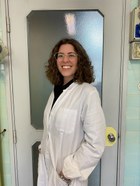
Viviana Mitarotonda
Cycle 38th
Supervisor: Prof Manuela Bartolini
Co-supervisor: Dr Elisa Uliassi
PhD title: Identification of PROTACs (Proteolysis-targeting chimeras) directed at targets involved in neuroinflammation
Project Description: The PhD activities are planned in the framework of Spoke 7 - Neuroimmunology and neuroinflammation, within the PNRR extended partnership (PE) 12 titled “A multiscale integrated approach to the study of the nervous system in health and disease (MNESYS)”, and will be focused on the design and development of PROteolysis-Targeting Chimeras (PROTAC) directed to specific neuroinflammatory targets as a possible therapeutic treatment for Alzheimer's disease. PROTACs are heterobifunctional small molecule "degraders" consisting of a binding moiety for a E3 ubiquitin ligase, a ligand targeting a protein of interest (POI) and a linker. The interaction of a PROTAC molecule with POI and E3 ligase leads to the formation of a ternary complex, the polyubiquitination of the POI, and its subsequent degradation by the proteasome.

Giorgia Procaccianti
Cycle 38th
Supervisor: Silvia Turroni
PhD title: Multi-omic profiling of disease-associated microbiomes for the development of precision and customized intervention strategies
Project description:
Given the fundamental role of GM in maintaining the metabolic and immunologic homeostasis of the host, its potential for modulation in a targeted and precise way appears increasingly relevant in the healthcare field. In drug discovery, the “one disease–one target–one drug” approach is a common practice, mainly to simplify compound screening, reduce unwanted side effects, and simplify registration. However, this approach oversimplifies disease mechanisms, which are actually complex subnetworks within the interactome. The PhD project will address this issue, demonstrating that through the analysis of the GM composition of patients it is possible to identify the species linked to a certain disease, which can then be used as a means of early diagnosis and as a target to investigate the accuracy of diagnosis and tailored intervention strategies for the treatment of a given disease. If proven effective, new therapies could be identified for the treatment of diseases that do not yet have a definitive treatment, such as obesity, metabolic syndrome or cancer.
Personal Background: Graduated in Medical Biotechnology at University of Bologna with 110/110 cum laude in 2022.
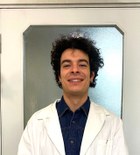
Federico Sdei
Cycle 38th
Supervisor: Maria Laura Bolognesi
PhD title: Targeting RNA for degradation with small molecules: development of ribonuclease targeting chimeras (RIBOTACs).
Project Description: RIBOTACs are very challenging compounds given the exploitation of a chemistry that use a MoA came out in the last two decades, degrading desired targets. The chosen target is human microRNA-21 (miR-21), a well-known protooncogene, marker of fibrosis, and molecular link between inflammation and various diseases; miR-21 plays a causal role in malignant transformation, metastatic spread, or resistance to treatment, suggesting that pharmacological inhibition of this “oncomiR” might reverse even late-stage cancer. The goal of this project is to synthesize compounds that are able to have biological activity, through SAR studies we will have an optimization and modeling of the compounds, including through computational approaches that allow further studies of the interaction between the RNA-related pocket into which the compound will be able to fit.
Personal background:
Federico Sdei obtained his MSc degree in Chemical Sciences at University of Perugia with 110/110 in 2022, working on a Medicinal Chemistry Thesis. The aim of thesis was the identification of E3 ligases overexpressed in CNS for the rational design of selective PROTACs. Following the graduation, he spent the next year in Pharmaceutical Company named Takeda to work as QA coordinator.

Federica Bichicchi
Ph.D student
Cycle 39th
Supervisor: Prof. Giorgio Gallinella
Co-supervisor: Dr. John "Jay" Chiorini
Project title: Characterization of salivary glands virome in Sjögren’s Syndrome patients through the use of Spatial transcriptomics
Project description: Sjögren’s Syndrome (SS) is a chronic autoimmune disorder characterized by lymphocytic infiltration of the salivary and lacrimal glands. Currently, the exact cause of onset is not known. Salivary glands are deeply involved in the pathology of SS, serving as the primary target of autoimmune-mediated damage. An extensive set of viruses are known to infect these cells. Emerging evidence suggests that viral infections may play a significant role in disease development and progression. The project aim is to detect and characterize viral genetic material in salivary gland samples of patients affected with the syndrome to determine the influence of infections on SS onset and pathogeny.
Background: BSc in Genomics @ University of Bologna, 2020. Msc in Pharmaceutical Biotechnology @ University of Bologna, 2022

Sara Calistri
Ph.D student
39th Cycle
Supervisor: Prof. Maria Laura Bolognesi
Co-supervisor: Dott. Alberto Ubaldini (ENEA)
PhD Thesis name: Synthesis, Physico-chemical characterization of biocompatible hydrogels for applications in the field of neutron radiotherapy
Project Description: The project aims to develop hydrogels embedded with nanoparticles for application in neutron radiotherapy. Focused on protecting healthy tissues post-surgical tumor resection, the hydrogels, spread over the tumoral bed during neutron radiotherapy, act as a shield, mitigating damage to surrounding tissues. The hydrogels, containing specially designed nanoparticles with high neutron radiation absorption capacity, are synthesized and characterized for optimal physico-chemical properties. The research involves an in-depth exploration of nanoparticle synthesis, emphasizing compatibility with the hydrogel matrix and subsequent seamless integration into the hydrogels.
Background: Master's Degree in Pharmaceutical Chemistry and Technology at the University of Bologna (110/110 with honors) working at the Eberhard Karls Universität Tübingen (DE). Currently, PhD student at the ENEA Research Center.

Chiara Cimetti
Cycle 39th
Supervisor: Prof.ssa Monica Baiula
Co-supervisor: Prof. Andrea Bedini
Thesis title: Characterization of integrated mechanisms contributing to neuroinflammation-related central dysfunctions for the development of innovative RNA-based drugs
Project Description: The aim of this project is to better understand the dynamics of molecular determinants, including REST, that characterize the neuronal-astrocyte crosstalk under neuroinflammatory condition with the aim of identifying new targets for the development of innovative RNA-based drugs.

Lucrezia Galassi
Ph.D student
39th Cycle
Supervisor: Paolo Blasi
Co-supervisor: Magda Blosi
Project title: Green Synthesis of Multifunctional Nanoparticles for Theranostics
Project description: the main intention in this project is to develop preparation methods to produce multifunctional nanoparticles for theragnostic purposes.
The final scope will be to engineer clinically relevant multifunctional nanocarriers loaded with magnetic nanoparticles to be activated by external magnetic field and so, able to release the drug payload once the tumor site is reached, making them suitable for diagnostic and therapeutic purposes.
Background: I graduated in Pharmacy with a thesis in Pharmaceutical Technologies titled “Formulative studies of nanoparticle systems for Fenretinide’s vehiculation”. I kept working for a year as a reserch fellow in the same lab improving my knowledge on cell coltures and cytofluorimetry.
Sara Lugli
Ph.D student
Cycle 39th
Supervisor: Dott.ssa Angela Abruzzo
Co-supervisor: Prof.ssa Maria Laura Bolognesi
PhD thesis title: Development of lipid or polymer-based nanocarriers for the treatment of emerging infections
Project description: The aim of this project is to design new nanoparticle-based drug delivery systems to improve the efficacy of the treatment of emerging infection diseases. Different excipients, such as phospholipids and biocompatible polymers, and various manufacturing methods, will be evaluated to develop nanocarriers suitable to deliver different antimicrobial agents (e.g. conventional APIs, recently synthesized or derived from natural sources). The optimization of functional properties of nanoparticles can allow to control the drug release, to promote its accumulation and consequently increase its residence time at the infection site, thus obtaining an improvement of the antimicrobial effect. These objectives will contribute to maximize the drug efficacy, limiting the antimicrobial resistance phenomenon and improving patient compliance.
Funded by the EU - NextGenerationEU with funds made available by the National Recovery and Resilience Plan (NRRP) - Partenariati Estesi (PE13 - INF-ACT) - CUP J33C22002870005
Background: Graduated in Pharmaceutical Chemistry and Technology at Università di Bologna in 2022.

Wendy Mensah
Ph.D student
Cycle 39th
Supervisor: Prof.ssa Manuela Bartolini
Co-supervisor: Dr Sebastijan Peljhan.
PhD title: Development of analytical platforms based on immobilized enzymes and proteins to improve automation and cost-effectiveness.
PhD description: The aim of the PhD project is the development of Peptide-N-Glycosidase F-based Immobilized Enzyme Reactors (IMERs) through the immobilization of the enzyme onto newly marketed monolithic support with different shapes and pore sizes. The best performing IMERs will be further characterized and applied to the deglycosylation of both large and small substrates. Furthermore, an analytical platform for glycan characterization will be set up to simplify glycosylation profiling of therapeutic proteins.
Background: Wendy obtained her MSc degree in Pharmaceutical Chemistry and Technology in February 2023 at the University of Bologna (100/100 cum laude) with a master thesis in pharmaceutical analysis. The aim of the thesis was the development of an analytical method for the characterization of the sugar component of exopolysaccharides derived from vaginal lactobacilli.
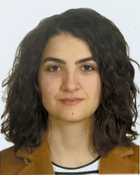
Francesca Pellegrino
Ph.D student
Cycle 39th
Supervisor: Dr. Marco De Vivo
PhD Thesis: Characterization and inhibition of DNA polymerase η to treat cancer
Project Description: Polymerase η (Pol-η) is a specialized DNA polymerase that is able to bypass certain blocking lesions, such as those generated by ultraviolet radiation or cisplatin, and is deployed to replication foci for translesion synthesis (TLS) as part of the DNA damage response (DDR). In standard-of-care cancer therapies involving platinum-based clinical agents, e.g., cisplatin or oxaliplatin, Pol-η can bypass platinum-DNA adducts, negating benefits of the treatment and enabling drug resistance. The PhD research project is focused on the identification of new Pol-η inhibitors and the characterization of their interactions to improve platinum-based cancer treatment and overcome the drug resistance.
Background: Graduated in Pharmaceutical Chemistry and Technology at University of Padova in 2022 (110/110 cum laude). Thesis title “Vimentin– G-quadruplex interaction as a new target for anticancer therapy: ligands screening and validation”. Research fellow at Department of Clinical and Molecular Medicine, “Sapienza” University of Rome in 2023. Currently, PhD student at Italian Institute of Technology (IIT).

Luca Pincigher
Ph.D student
Cycle 39th
Supervisor: Prof.ssa Romana Fato
Co-Supervisor: Prof.ssa Cecilia Prata
PhD Title: Study of bioactive molecules extracted from selected plant matrixes. Evaluation of cellular bioenergetic activity, with the aim of identifying new molecules with pharmacological activity.
Project Description: Plants in general are excellent sources of bioactive compounds. The aim of this research project is to evaluate the biological activity of some secondary plant metabolites and phytoextracts. In particular, their effect on mitochondrial functions and cellular metabolism will be investigated to exploit their potential pharmacological activity, for example in cancer or neurodegeneration. The different molecules will be tested in cellular models to investigate their mechanism of action and optimal dosage.
Background: BSc in Biological Sciences at the University of Bologna in 2021.
MSc in Health Biology focused on Human Nutrition at the University of Bologna in 2023.

Martina Quatraccioni
Ph.D student
39th Cycle
Supervisor: Andrea Cavalli
Co-supervisor: Viola Previtali
PhD Thesis name: TARGETING DNA REPAIR MECHANISMS TOWARD SYNTHETIC LETHALITY-BASED DRUG DISCOVERY
Project Description: The PhD research project will be focused on the design and synthesis of new RAD52 inhibitors to induce synthethic lethality. This will be achived starting from two hits that were identified, by the group of Prof. Cavalli, as capable of binding RAD52 in its two structural forms and inhibiting the DNA binding (in vitro inhibitory activity tests). Based oh these promising results, as part of my project, I will synthesize the two hits, and an effective drug discovery campaign will be fostered in order to obtain lead compounds with improved affinity constants and activity
Background: Graduated in Pharmaceutical Chemistry and Technology at Università of Pisa in 2023

Elena Roggiolani
Ph.D student
Cycle 39th
Supervisor: Prof. ssa Anna Minarini
Thesis Name: Design and synthesis of protein kinases’ inhibitors involved in neuroinflammatory processes
Project description: The PhD project concerns firstly the design and synthesis of small molecules that can interact with the kinases under study, such as GSK3β, FYN and DIRK1A modulating or inhibiting them, so as to define their involvement in neuroinflammatory processes. We will move in two directions to overcome the kinases' selectivity problem: allosteric modulation and covalent inhibition of kinases in study.
Personal Background: Graduated in Pharmaceutical Chemistry and Technologies from Alma Mater Studiorum - University of Bologna with 110/110 with honor in 2022, with a thesis focused on the design and synthesis of multitarget inhibitors for bipolar disorder.

Rosaria Spagnuolo
Ph.D student
Cycle 39th
Supervisor: Prof.ssa Manuela Bartolini
Co-supervisor: Prof.ssa Marina Naldi
PhD Project Title: Development of analytical methods to investigate the activity and interaction mode of compounds of pharmaceutical interest.
PhD Project: Early phase drug discovery campaigns imply the screening and initial characterization of small to large libraries of compounds. In the early phase single molecules or complex extracts are generally ranked based on their activity on single or multiple targets, prior or in parallel further characterization. Correct priorization implies the availability of a suitable set of assays which suit to the purpose. Preferably, those assays should be robust, cost-effective and eligible for mid-to-high throughput. In this light, my PhD project is structured along three lines: i) miniaturization, when possible, of commercially available or in-house developed in solution assays on isolated targets; ii) development of tailored assays for those targets of pharmaceutical interests lacking a fit-to-purpose assay; iii) development of surface-plasmon resonance (SPR)-based platforms to define structure-affinity relationships and interaction kinetics. SPR technology has been selected within this project since it allows to investigate biorecognition phenomena in real-time and to determine affinity constants as well as kinetic parameters.
Previous experience: Master’s Degree in Pharmacy at the University of Urbino Carlo Bo in 2022. Thesis title: “Applicazione della dinamica molecolare allo studio di molecole attive su GSK-3β”

Muhammad Waqar
Ph.D student
39th cycle
Supervisor: Dr. Roberto Gotti
PhD Thesis Name: Development and applications of miniaturized bioanalytical systems
Project Description: Microfluidics is a well-established field in academia and is rapidly gaining industrial attention mainly for the development of various life sciences products. Point-of-care testing (POCT) is becoming relatively common in developed countries to augment traditional diagnostic and medicinal approaches. POCT is also becoming cruicial to devloping nations due to its low cost, reduced number of clinical visits and improved patient satisfaction. Microfluidic devices are sub-millimeter scale miniaturized versions of biological laboratory processes. In most cases, the reagent flows in small diameter (10-500 µm) capillaries or channels. Paper is really being explored as an attractive substrate for microfluidic applications not only due to its low cost and ubiquity but also because of its flexibility, biocompatibility and its ability to imbibe aqueous mediums. Capillary action leads to the transport of materials in paper without any need of external power source. Detection of analytes by optical means (Colorimetric method) is the most inexpensive and simple method. Only qualitative detection of different diagnostic markers is not sufficient when analytes are linked to certain pathological/body conditions. Hence, much effort has been directed towards the quantitative paper-based assays.
Background: I completed my Master's degree in Industrial Biotechnology from National University of Sciences and Technology (NUST), Pakistan with a thesis on the Development of electrochemical biosensing platform for Mycobacterium tuberculosis.
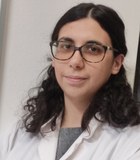
Chiara Zalambani
Ph.D student
Cycle 39th
Supervisor: Prof.ssa Cecilia Prata
Co-supervisor: Prof.ssa Maria Laura Bolognesi
PhD thesis name: Management and valorization of vegetable food waste in schools
Project description: when vegetables are disposed of, they still contain a lot of bioactive compounds. These compounds can be used as a new starting material for nutraceutical and pharmaceutical applications, according to a circular economy perspective. The intensification of agro-industrial processing and the high consumption of processed potato products, especially in school canteens, causes a large number of residues in form of potato peel waste every year. The first aim of this project is the study of bioactive compounds recovered from potato peel waste. The experimental analysis of the project will be dedicated to the evaluation of the biological effects and the molecular mechanism of fito-complex and purified molecules recovered from potato peel, in particular glycoalkaloids and phenols, in different cell models. In parallel, the project aims to sensitize children to the problem of food waste, collaborate with the school to reduce vegetable food waste, and suggest a new strategy for recycling.

Eva Benuzzi
Cycle 39th
Supervisor: Prof. Patrizia Hrelia
Cosupervisor: Dr. Gloria Ravegnini
Project title: Developement of 3D bioprinted models of sarcoma to identify novel pharmaceutical compounds

Filippo Piazza
Cycle 40th
Project title: Design and synthesis of PROTACs (Proteolysis targeting chimeras) as innovative drugs for West Nile infections
Supervisor: Prof.ssa Maria Laura Bolognesi
Cosupervisor: Dott.ssa Eleonora Diamanti

Ludovica Campolongo
Cycle 40th
Project title: Molecular and functional study of neuropathic and visceral pain in murine and hiPSC models of Fabry disease
Supervisor: Prof. Marco Caprini
Co-supervisor: Dott. Francesco Formaggio

Antonella Simone
Cycle 40th
Tutor unibo: Gloria Ravegnini
Tutor cnr: Monica Montesi
Project title: Development of novel 3D matrices for drug discovery in sarcomas

Ilaria Gasperini
Cycle 40th
Project title: "Single-cell transcriptomic and proteomic analysis in virus-cell interactions"
Supervisor: Prof. Giorgio Gallinella
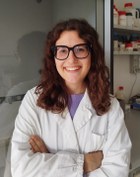
Eleonora De Renzis
Cycle 40th
Project title: Development of child-appropriate oral drug delivery systems to address pediatric unmet medical needs
Supervisor: Prof.ssa Beatrice Albertini
Co-supervisor: Prof.ssa Nadia Passerini

Federica Arienti
Cycle 40th
Project title: "Design and development of stimuli-responsive 3D biomimetic materials to
enhance soft tissue regeneration process"
enhance soft tissue regeneration process"
Supervisor: Prof.ssa Sabrina Angelini

Paolo Mangione
Cycle 40th
Project: Role of inflammatory mediators and their epigenetic regulation in neuropathic pain
Supervisor: Patrizia Romualdi
Co-supervisor: Laura Rullo
Co-supervisor: Laura Rullo
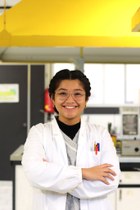
Aurora Gaza
Cycle 40th
Supervisor: Prof.ssa Maria Laura Bolognesi
Co-supervisor: Dr Eleonora Diamanti and Dr Elisa Uliassi
PhD title: Design and Synthesis of small chimeric molecules for antiparasitic drug discovery and chemical biology applications

Riccardo Zuffa
Cycle 40th
Project title: "Target-based design of DNA polymerase η inhibitors for the treatment of cancer"
Tutor: Prof.ssa Maria Laura Bolognesi
Co-tutor: Dott. Marco De Vivo

Alberto Pettinari
Cycle 40th
Project title: "Targeted Degradation Strategies for Rare Neurodegenerative Disorders: Developing PROTACs and RIBOTACs for Prion Disease Therapy."
Supervisor: Maria Laura Bolognesi
Cosupervisor: Elisa Uliassi

Marion Le Meur
-
Project title: Design of multifunctionalized nano-delivery systems for the treatment of circadian clock dysfunction in Alzheimer's disease
-
Supervisor: Valle Palomo, IMDEA Nanociencia (Madrid, Spain)
-
Cosupervisor: Paolo Blasi, Università di Bologna (Bologna, Italy)

Francesca Rombolà
Cycle 40th
Titolo del progetto: In vitro evatuation of safety profile and biocompatibility of healthcare products
Supervisor: Prof.ssa Monia Lenzi
Co-supervisor: Dr. Jacopo Lucci - Bios-Therapy - Aboca
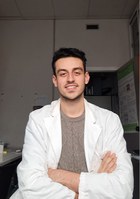
Lorenzo Anconelli
"AI tools for the study of TME and Biomineralization in Osteosarcoma hybrid spheroids"
Tutor: Stefano Iotti
Co-tutor: Emil Malucelli
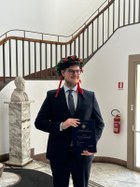
Alessandro Greco
Project title: Design and synthesis of novel Polymerase Eta inhibitors as anticancer agents;
Supervisors: Marco De Vivo, Marialaura Bolognesi

Sara Ventura
Cycle 41st
Supervisor: Prof.ssa Manuela Bartolini
Co-supervisor: Prof.ssa Marina Naldi
PhD title: Bioanalytical Approaches for Characterizing Ligand-Target Interactions
Project description:
Drug discovery is an iterative journey, and at every step, we face a critical challenge. Today, with the discovery of novel targets and the rise of non-traditional therapeutic approaches, there's a clear need for tailored and robust bioanalytical assays.
My project is designed to meet this challenge through a dual strategy: first, the optimization of existing critical methods, and second, the investigation of novel approaches to achieve superior performance. Our choice of technique is highly flexible, adapting to the target's stability, availability, and the ligand’s physico-chemical properties.
This means integrating various methodologies, including biochemical assays, biophysical methods and MS-based assays. We plan also to assess some preliminary drug likeness properties, like solubility and stability in assay and plasma conditions, in order to identify problematic molecules early to avoid compromising development. The focus is on integrating these assays sequentially, aiming to deliver a robust, transferable bioanalytical platform.

Martina D'Alessandro
Cycle 41st
Supervisor: Prof. Paolo Blasi
Co-supervisor: Dr. Elisa Corazza
PhD title: Advanced Nanomaterials to target genomic and Z-DNA for bacterial biofilm eradication
Project description:
The PhD project aims to develop an advanced nanotechnology-based platform for the targeted disruption of bacterial biofilms. Lipid nanoparticles (LNPs) will be functionalized with anti-Z-DNA antibodies to target Z-DNA motifs enriched in the extracellular polymeric substance (EPS) of biofilms. The LNPs will be characterized and engineered by leveraging a dual strategy: biofilm disassembly and structural destabilization and the intracellular delivery of short synthetic DNA oligonucleotides aimed at perturbing bacterial signalling or promoting intracellular stress. The ability to deliver novel antimicrobial agents will also be exploited.
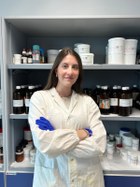
Martina Corsini
Cycle 41st
Supervisor: Prof.ssa Rita Morigi
Co-supervisor: Prof.ssa Maria Laura Bolognesi
PhD title: Design and synthesis of heterocyclic small molecules for cancer and infectious diseases
Project description:
The PhD research project aims to design and synthesize heterocyclic small molecules with antiproliferative and anti-infective activity, targeting innovative biological pathways. With the aim of expanding the chemical space and gaining interesting pharmacological activities, the project will involve a medicinal chemistry-driven drug discovery campaign to develop new active agents in both therapeutic areas, with a focus on non-canonical structures of nucleic acids and tubulin-based proliferation events.

Alessia Da Fermo
Cycle 41st
Supervisor: Prof.ssa Federica Belluti
Co-supervisor: Prof.ssa Alessandra Bisi
PhD title: Design and development of hybrid and multifunctional natural product-inspired compounds against Alzheimer’s Disease
Project description:
Alzheimer’s Disease (AD) is a multifactorial disorder that involves the impairment of multiple target and interconnected pathways, including the production of Aβ and hyperphosphorylated tau proteins, their aggregation into toxic species, and the resulting oxidative stress and neuroinflammation. This project aims to develop hybrid compounds with a multitarget bioactivity profile, capable of addressing the complex character of AD by exploiting different hybridisation strategies to combine an NP-inspired scaffold and an AD-relevant pharmacophore. In particular, among the NP-related scaffolds, flavonoids and stilbenes are selected for their well-assessed anti-neurodegenerative properties; their conjugation with suitable AD-targeting synthons would offer promise for expanding and improving the bioactivity profile.

Sara Mighela
Cycle 41st
Supervisor: Prof. Andrea Cavalli
Co-supervisor: Dr. Stefania Girotto
PhD Title: Innovative strategies to explore synthetic lethality in cancer therapy
Project Description: The project focuses on exploiting synthetic lethality within DNA repair pathways to develop new treatments for pancreatic cancer that can be administered in combination with PARP inhibitors and, importantly, extend beyond their use to overcome resistance. The research will use biophysical approaches to characterize novel targets and to refine understandin of established ones by analyzing their structure, mechanisms, and interactions with key partners.
Background: Graduated in Pharmaceutical Chemistry and Technology at Università of Cagliari in 2024

Angela Pagliaro
Cycle 41st
Supervisor: Marco De Vivo
Co-supervisor: Prof. Maria Laura Bolognesi
PhD Title: Structure-based design of small-molecule RhoA inhibitors for cancer

Duyen Polidori
Cycle 41st
Supervisor: Marco De Vivo
Co-supervisor: Maria Laura Bolognesi
PhD Title: Investigating Allosteric Mechanisms of Drug Resistance in Cancer via Computational Approaches
Project Description: This project explores how distant allosteric mutations in the BCR-ABL1 kinase drive resistance to existing tyrosine kinase inhibitors. By combining molecular dynamics simulations, binding-pocket profiling, and residue-interaction network analysis, the study seeks to reveal hidden communication pathways and dynamic mechanisms that regulate kinase activation. The ultimate goal is to identify novel allosteric sites and mechanistic insights that can inform the design of next-generation therapeutic strategies to overcome drug resistance in BCR-ABL1-driven cancers.

Veronica Fiorelli
Cycle 41st
Supervisor: Marco De Vivo
Co-supervisor: Maria Laura Bolognesi
PhD Title: Unravelling the role of the finger domain conformational changes in the low-fidelity DNA polymerase theta
Project description: This project investigates how conformational changes within the finger domain of DNA polymerase theta (Polθ) influence its characteristically low-fidelity nucleotide incorporation. Notably, Polθ is expressed almost exclusively in homologous recombination–deficient tumor cells, thus representing a highly promising therapeutic target for cancer treatment. Using computational approaches based on molecular dynamics simulations and free energy calculations, we aim at exploring the structural flexibility and atypical motions that may explain Polθ’s error-prone behavior. This mechanistic insight may help in the search for potent Polθ inhibitors.
Background: Veronica Fiorelli graduated with a Master of Science in Industrial Biotechnology from the University of Tuscia (Viterbo) in 2024. In April 2025, she relocated to Genoa to work as a research fellow at the Italian Institute of Technology, where she is currently a PhD student.

Arianna Monacelli
Ciclo 41st
Supervisor: Prof.ssa Teresa Cerchiara
Co-supervisor: Prof.ssa Barbara Luppi
Project title: Development of innovative nanocarriers loading bioactive molecules for wound care
Project description:
The project aims to identify new bioactive molecules for wound care with anti-inflammatory, antioxidant, and antibiotic activities derived from different natural sources, while optimizing the extraction processes using greener solvents and methods.
The extracted molecules will be encapsulated in various nanocarriers (ethosomes, liposomes, phytosomes, and exosomes) and incorporated into final formulations such as hydrogels, films, and dressings.

Gaia Lusoli
Ciclo 41st
Supervisor: Prof. Andrea Bedini
Co-supervisor: Prof.ssa Monica Baiula
Project title: Advanced in vitro models for drug discovery: targeting integrins and opioid receptors to tackle neuroinflammation with innovative ligands.
Project description: The aim of this project is to develop advanced in vitro models to recapitulate the complexity of the neuroinflammatory environment, enabling the identification and characterization of novel therapeutic targets, with a particular focus on integrins and opioid receptors as potential modulators of neuroinflammation.

Filippo Bonizzoni
Ciclo 41st
Supervisor: Prof. Andrea Cavalli
Co-supervisor: Dott.ssa Rita Scarpelli
Project title: Design, synthesis and biological evaluation of small molecules targeting synthetic lethality for cancer therapy
Background: Graduated in Pharmacy at University of Pavia in 2025

Martina Rubino
Ciclo 41st
Supervisor: Prof.ssa Lucia Carboni
Co-supervisor: Prof. Roberto Rimondini
Project title: Investigating the role of IgLONs in Depression and other Neuropsychiatric Disorders
Project description: IgLONs are a subclass of cell adhesion molecules primarily involved in neuronal growth and synapse development. Alteretions in IgLON gene have been associated with depression, schizophrenia and autism. The project aims to clarify the link between miRNAs, IgLON proteins and chronic stress, contributing to the understanding of the molecular mechanisms underlying depression and neuropsychiatric disorders, paving the way for the discovery of potential therapeutic targets or biomarkers.
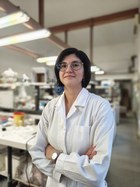
Martina Salmi
Ciclo 41st
Supervisor: Prof. Christian Bergamini
Co-supervisor: Dott. Nicola Rizzardi
Project title: Restoring Mitochondrial Function in Rare Genetic Disorders: A Translational Approach Using CoQ10
Project description: This PhD project investigates the metabolic and molecular alterations related to mitochondrial disfunctions in rare genetic disorders. We aim to determine the functional effects and the molecular mechanisms of mutations in disease cell models and patient-derived fibroblasts and evaluate the rescue effect of CoQ10 on the cellular bioenergetic.